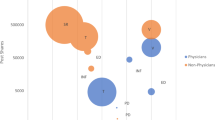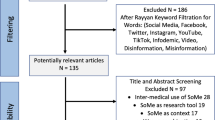Abstract
Physicians significantly underutilize social media despite its potential for global medical communication and public education. Purposeful use of social media—with strategic content, optimized timing, and platform-specific approaches—can dramatically improve research dissemination and clinical influence. We outline challenges introduced by the shift from chronological timelines to algorithm-driven content delivery, which prioritizes engagement over evidence. These changes reduce the visibility of traditional scientific content. Our research confirms that posts with broad public appeal consistently generate higher engagement than narrow academic discussions. We present evidence-based case studies, including COVID-19 social media campaigns that reached over 4 million impressions per month and influenced public policy. We also highlight best practices for educational videos. Finally, we illustrate how online collaborations between researchers and families can improve clinical practice using the example of families of children with trisomy 18. Effective social media engagement requires visual abstracts, short videos, and simplified messages tailored for algorithms. Medical hashtags, strategic timing, and collaborations with ethical influencers can further enhance reach. When used ethically and strategically, social media becomes a transformative tool—combating misinformation, informing the public, and supporting professional advancement. For physicians in all specialties, social media literacy is becoming an essential skill for modern healthcare communication.
Impact
-
Strategic use of social media empowers physicians to disseminate evidence-based research amidst misinformation and algorithmic bias.
-
This article provides a practical framework for optimizing academic engagement online, bridging the gap between digital reach and academic scholarly recognition.
-
Effective digital scholarship legitimizes science. It is essential to uphold credibility, influence public discourse, and support informed clinical care.
This is a preview of subscription content, access via your institution
Access options
Subscribe to this journal
Receive 14 print issues and online access
$259.00 per year
only $18.50 per issue
Buy this article
- Purchase on SpringerLink
- Instant access to the full article PDF.
USD 39.95
Prices may be subject to local taxes which are calculated during checkout

Similar content being viewed by others
References
Roland, D. Social media and the digital health arena. Future Healthc. J. 4, 184–188 (2017).
Dyson, M. P. et al. Social Media for the Dissemination of Cochrane Child Health Evidence: Evaluation Study. J. Med Internet Res. 19, e308 (2017).
Hameed, I. et al. Analysis of Physician Use of Social Media. JAMA Netw. Open 4, e2118213 (2021).
Metzler, H. & Garcia, D. Social drivers and algorithmic mechanisms on digital media. Perspect. Psychol. Sci. 19, 735–748 (2024).
Chan, T., Trueger, N. S., Roland, D. & Thoma, B. Evidence-based medicine in the era of social media: scholarly engagement through participation and online interaction. Can. J. Emerg. Med. 20, 3–8 (2018).
Parsi, K. & Elster, N. Why Can’t We Be Friends? A Case-Based Analysis of Ethical Issues with Social Media in Health Care. AMA J. Ethics 17, 1009–1018 (2015).
Roland, D. & Brazil, V. Top 10 ways to reconcile social media and ‘traditional’ education in emergency care. Emerg. Med. J. 32, 819–822 (2015).
Nash, E., Bickerstaff, M., Chetwynd, A. J., Hawcutt, D. B. & Oni, L. The readability of parent information leaflets in paediatric studies. Pediatr. Res. 94, 1166–1171 (2023).
Albrecht, S. S. et al. Lessons Learned From Dear Pandemic, a Social Media–Based Science Communication Project Targeting the COVID-19 Infodemic. Public Health Rep. 137, 449–456 (2022).
Habibi, S. A. & Salim, L. Static vs. dynamic methods of delivery for science communication: a critical analysis of user engagement with science on social media. PloS One 16, e0248507 (2021).
Leong, C. M. et al. Social Media–Delivered Patient Education to Enhance Self-management and Attitudes of Patients with Type 2 Diabetes During the COVID-19 Pandemic: Randomized Controlled Trial. J. Med. Internet Res. 24, e31449 (2022).
Janvier, A., Farlow, B. & Wilfond, B. S. The experience of families with children with trisomy 13 and 18 in social networks. Pediatrics 130, 293–298 (2012).
Adams, S. Y., Tucker, R. & Lechner, B. E. The new normal: parental use of online health communities in the NICU. Pediatr. Res. 91, 1827–1833 (2022).
Barrington, K. “Our children are not a diagnosis” – what an amazing response! Neonatal Res. (blog), July 26, 2012. Available from: https://neonatalresearch.org/2012/07/26/our-children-are-not-a-diagnosis-what-an-amazing-response/ (accessed June 10, 2025).
Crestodina, A. The social media rule of thirds and 3 best practices for social media management. Orbit Media (blog), published ~May 2021. Available from: https://www.orbitmedia.com/blog/social-media-rule-of-thirds/ (accessed June 10, 2025).
Ibrahim, A. M. Improving the performance of research journals: lessons learned from the visual abstract. Sci. Ed. 47, 43–46 (2024).
Comp, G. Dyer, S. Gottlieb, M. Is TikTok the next social media frontier for medicine? AEM Educ Train. 5, https://doi.org/10.1002/aet2.10532 (2020)
Chaudhry, A., Glodé, L. M., Gillman, M. & Miller, R. S. Trends in Twitter use by physicians at the American Society of Clinical Oncology Annual Meeting, 2010 and 2011. J. Oncol. Pr. 8, 173–178 (2012).
Tapper, E. B., Mirabella, R., Walicki, J. J. & Banales, J. M. Optimizing the use of Twitter for research dissemination: the “Three Facts and a Story” randomized-controlled trial. J. Hepatol. 75, 271–274 (2021).
Kuhn, T. Using the AIDA language to formally organize scientific claims. In Controlled Natural Language: Proceedings of the Sixth International Workshop, CNL 2018 (eds Davis B., Wyner A., Keet C. M.) 304, 52–60 (IOS Press, 2018).
Hadeed, J. Social Media Focus: How often (and when) should you post? Am Soc Plast Surg (blog), March 2, 2019. Available from: https://www.plasticsurgery.org/for-medical-professionals/publications/psn-extra/news/social-media-focus-how-often-and-when-should-you-post/ (accessed June 10 2025).
Volodina, K. 12 tools to plan and schedule social media posts for free. Planable (blog), May 8, 2025. Available from: https://planable.io/blog/schedule-social-media-posts/ (accessed June 10 2025).
Lord E. Healthcare content marketing: 2025 observances. Geonetric (blog); December 26, 2024. Available from: https://www.geonetric.com/general/2025-observances-to-incorporate-into-your-healthcare-content-marketing/ (accessed June 10 2025).
Powwow Events. How to leverage social media during healthcare conferences. Powwow Event (blog), October 4 2024. Available from: https://www.powwowevent.com/how-to-leverage-social-media-during-healthcare-conferences (accessed June 10 2025).
Santarone, K., Boneva, D., McKenney, M. & Elkbuli, A. Hashtags in healthcare: understanding Twitter hashtags and online engagement at the American Association for the Surgery of Trauma 2016–2019 meetings. Trauma Surg. Acute Care Open 5, e000496 (2020).
Harris, J., Atkinson, A., Mink, M. & Porcellato, L. Young people’s experiences and perceptions of YouTuber-produced health content: implications for health promotion. Health Educ. Behav. 48, 199–207 (2021).
Wolbrink, T. A., Kissoon, N., Mirza, N. & Burns, J. P. Building a global, online community of practice: the OPENPediatrics World Shared Practices Video Series. Acad. Med. 92, 676–679 (2017).
Woo, B. K. & Lu, H. T. Leveraging social media analytics for physicians. Acad. Med 98, 156–157 (2023).
Acquaviva, K. D. et al. Documenting social media engagement as scholarship: a new model for assessing academic accomplishment for the health professions. J. Med Internet Res. 22, e25070 (2020).
Gasparyan, A. Y. et al. Researcher and author profiles: opportunities, advantages, and limitations. J. Korean Med Sci. 32, 1749–1756 (2017).
Gifford, E. D. et al. Society for Vascular Surgery best practice recommendations for use of social media. J. Vasc. Surg. 74, 1783–1791.e1 (2021).
Fargen, K. M. et al. Social media usage for neurointerventionalists: report of the Society of NeuroInterventional Surgery Standards and Guidelines Committee. J. Neurointerv Surg. 13, 674–678 (2021).
Husain, A. et al. Consensus guidelines for digital scholarship in academic promotion. West J. Emerg. Med. 21, 883–891 (2020).
Bisset, C. N., McDermott, F. D. & Keller, D. S. The impact of a dedicated social media strategy on enhancing surgical education. Langenbecks Arch. Surg. 408, 412 (2023).
Widmer, R. J. et al. Effect of promotion via social media on access of articles in an academic medical journal: a randomized controlled trial. Acad. Med. 94, 1546–1553 (2019).
Author information
Authors and Affiliations
Contributions
Dr. Kikelomo Babata contributed to the conception and design of the manuscript, drafted the initial version, revised it critically for important intellectual content, and approved the final version for submission. Dr. Daniel O’Reilly contributed to the conception and design of the manuscript, drafted the initial version, revised it critically for important intellectual content, and approved the final version for submission. Dr. Damian Roland contributed to the conception and design of the manuscript, reviewed the original version, revised it critically for important intellectual content, and approved the final version for submission.
Corresponding author
Ethics declarations
Competing interests
The authors declare no competing interests.
Additional information
Publisher’s note Springer Nature remains neutral with regard to jurisdictional claims in published maps and institutional affiliations.
Rights and permissions
Springer Nature or its licensor (e.g. a society or other partner) holds exclusive rights to this article under a publishing agreement with the author(s) or other rightsholder(s); author self-archiving of the accepted manuscript version of this article is solely governed by the terms of such publishing agreement and applicable law.
About this article
Cite this article
Babata, K., O’Reilly, D. & Roland, D. Transforming academic medicine through social media: why isn’t it working for me?. Pediatr Res (2025). https://doi.org/10.1038/s41390-025-04388-0
Received:
Revised:
Accepted:
Published:
Version of record:
DOI: https://doi.org/10.1038/s41390-025-04388-0



